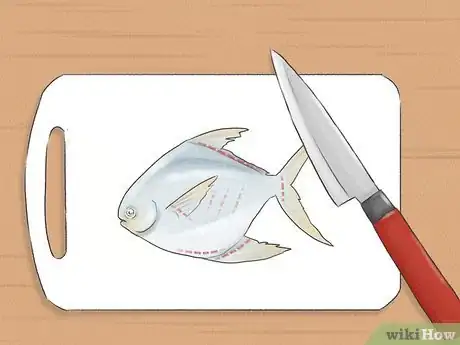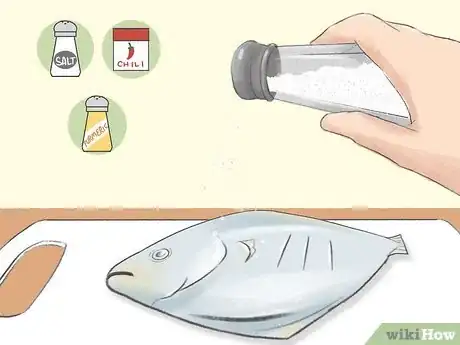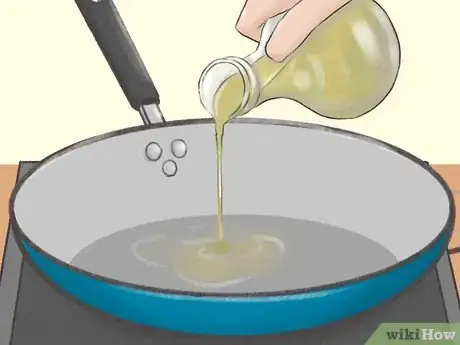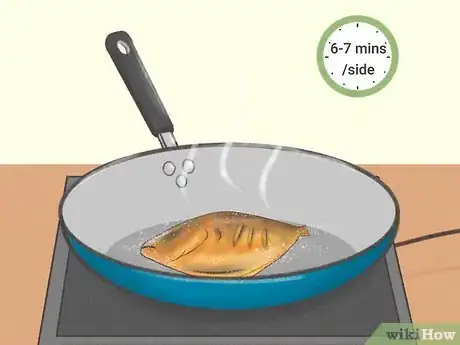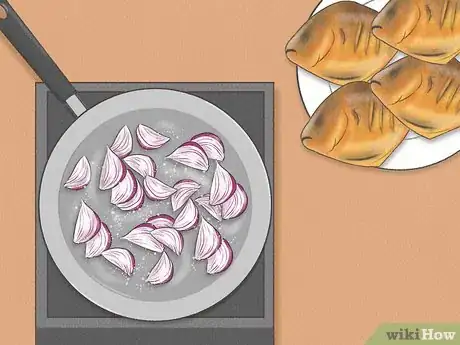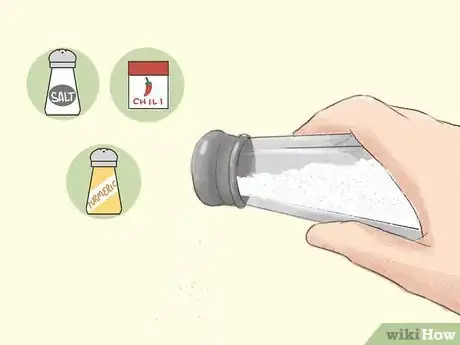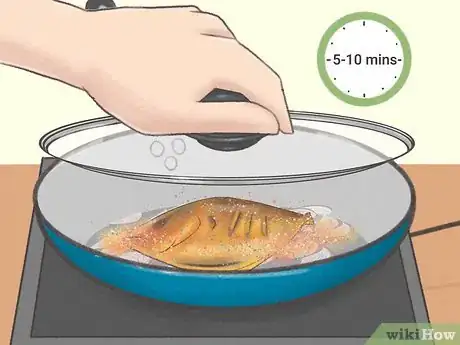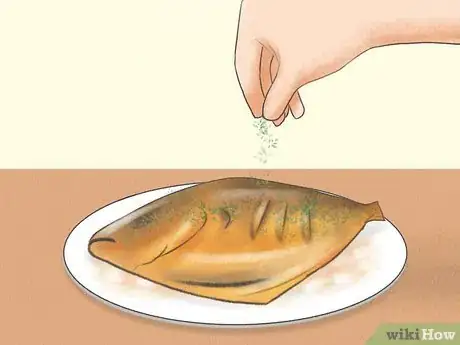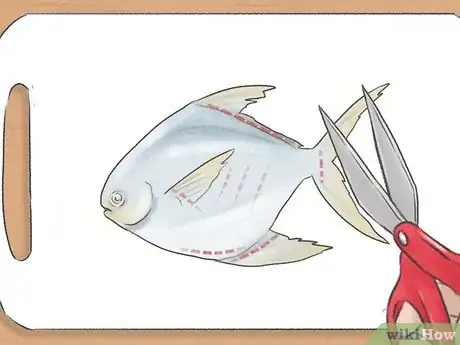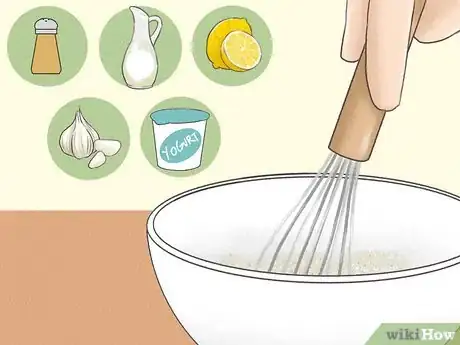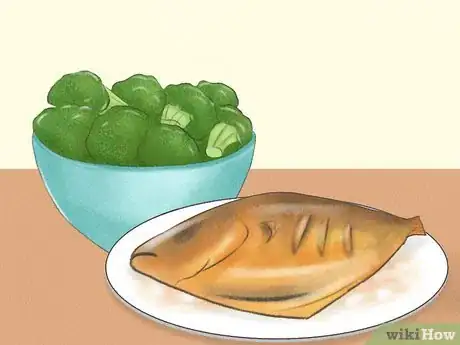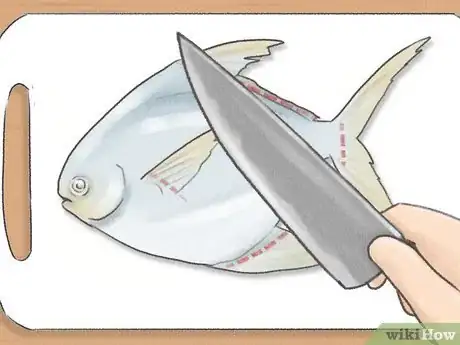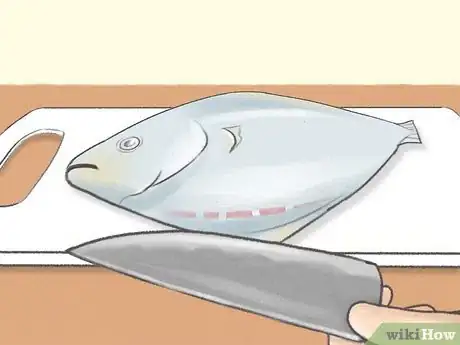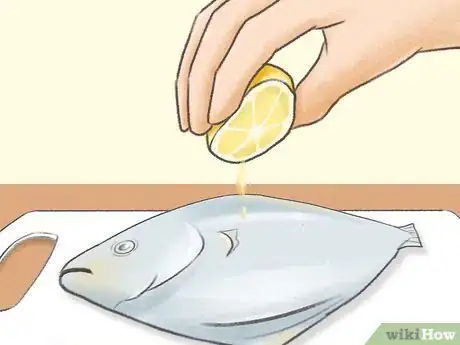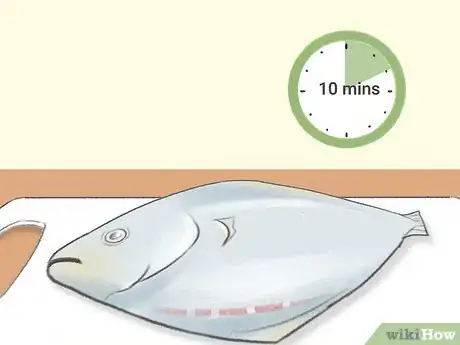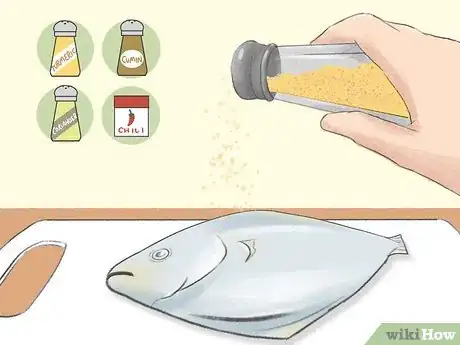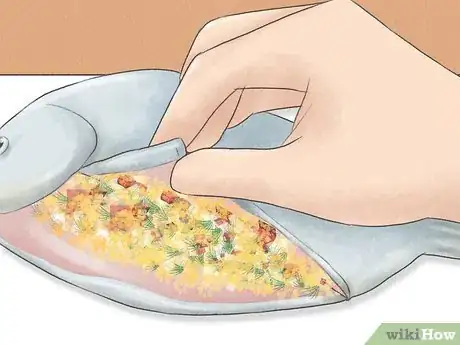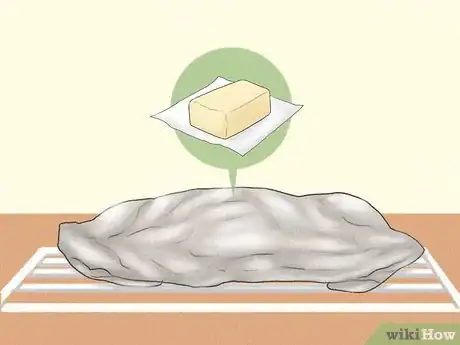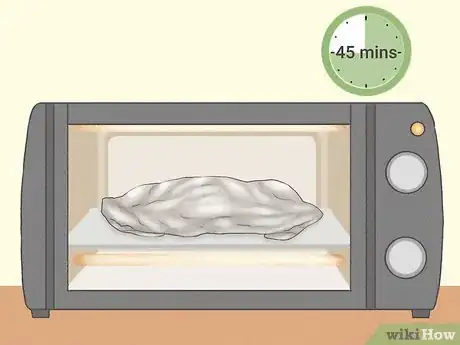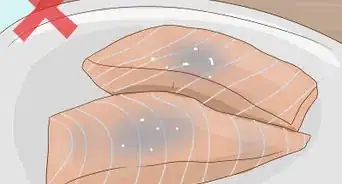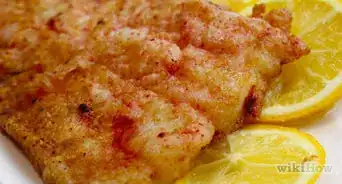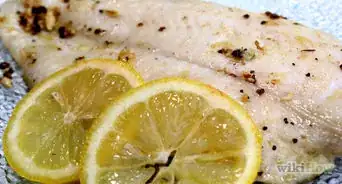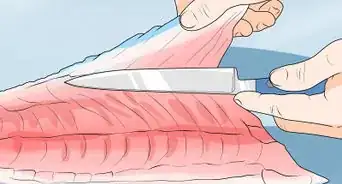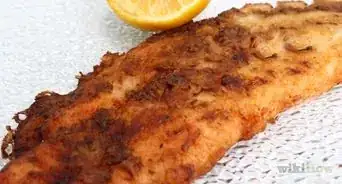This article was co-authored by Ollie George Cigliano and by wikiHow staff writer, Jessica Gibson. Ollie George Cigliano is a Private Chef, Food Educator, and Owner of Ollie George Cooks, based in Long Beach, California. With over 20 years of experience, she specializes in utilizing fresh, fun ingredients and mixing traditional and innovative cooking techniques. Ollie George holds a BA in Comparative Literature from The University of California, Berkeley, and a Nutrition and Healthy Living Certificate from eCornell University.
There are 17 references cited in this article, which can be found at the bottom of the page.
This article has been viewed 9,377 times.
If you love serving whole fish, you've got to try rupchanda, which is also called pomfret! This fish is popular in India and Bangladesh where it's usually seasoned with turmeric, chili powder, and citrus juice. Give this seasoning a try and pan-fry your fish, toss it on the grill, or roast it in the oven. You'll be rewarded with tender, flaky fish that's bursting with flavor.
Ingredients
- 3 to 4 whole rupchanda
- 1 teaspoon (2 g) of chili powder, divided
- 1 teaspoon (2 g) of turmeric powder, divided
- 2 onions, sliced thinly
- Salt to taste
- Up to 1⁄2 cup (120 ml) of water
- Freshly chopped cilantro for garnish
- Vegetable oil for frying
- 3 tomatoes, sliced, optional
Makes 3 to 4 servings
- 1/4 teaspoon (0.55 g) of turmeric powder
- 1 teaspoon (2 g) of garam masala powder
- 1/2 cup (122 g) of plain yogurt
- 4 tablespoons (59 ml) of mustard oil
- 1/2 teaspoon (2.5 g) of ginger paste
- 8 whole rupchanda
- 2 tablespoons (16 g) of chili powder
- 1 tablespoon (6 g) of chickpea flour (besan)
- Salt to taste
- 2 tablespoons (30 ml) of lemon juice
- 1/2 teaspoon (2 g) of garlic paste
Makes about 8 servings
- 1 large rupchanda
- 2 tablespoons (30 ml) of lemon juice
- 1 small onion, peeled and sliced
- 1 inch (2.5 cm) piece of fresh ginger, peeled and sliced
- 1 bunch of fresh cilantro
- 3 small green chilies, sliced in half
- 3 cloves of garlic, sliced
- 2 tablespoons of butter
- Turmeric powder, cumin powder, coriander powder, and dry red chili powder to taste
- Salt to taste
Makes 1 to 2 servings
Steps
Pan-Fried Rupchanda
-
1Remove the fins, tails, and guts from 3 to 4 whole rupchanda fish. Carefully cut off the small fins that are on both sides of the fish and cut off the tail. Then, make a slit along the bottom edge of the fish so you can reach in and pull out the guts. Make 3 or 4 thin slits on the sides of the fish before you rinse them in cool water and drain them.[1]
- The shallow slits help the fish absorb more of the seasoning.
- If you want to cook more than 3 or 4 rupchanda, prep as many fish as you like, but keep in mind that you'll have to fry them in batches.
-
2Season both sides of the fishes with salt, chili powder, and turmeric. Sprinkle each fish with salt to taste, 1/4 teaspoon (0.75 g) of turmeric powder, and 1/4 teaspoon (0.65 g) of chili powder. Use your fingers to rub the spices on both sides of each fish so they're seasoned really well.
- Feel free to play around with the seasonings. Rub the fish with green or red curry paste, for instance.
Advertisement -
3Heat 2 tablespoons (30 ml) of oil in a skillet and add the rupchanda. Set a skillet on the stove and pour 2 tablespoons (30 ml) of vegetable oil into it. Turn the burner to medium-high and heat the oil until it shimmers. Then, slowly lower all of the seasoned rupchanda into the skillet.[2]
- Since the rupchanda is so thin, you don't need a lot of oil to fry it up. The vegetable oil just helps it crisp up and prevents it from sticking to the pan.
-
4Fry the fish for 6 or 7 minutes on each side. Cook the fish until it turns golden brown on the bottom. This should take 6 or 7 minutes. Then, use tongs or a flat spatula to carefully flip them over and fry the fish for another 6 or 7 minutes or until they're crispy.[3]
- If the fish turn brown within the first minute or two, turn the burner down to medium.
-
5Remove the fish and add 2 sliced onions to the skillet. Use tongs to transfer your pan-fried rupchanda to a plate, but leave the burner on. Put 2 thinly sliced onions into the oil that's still in the skillet and stir until they're coated.[4]
- If your fish absorbed all of the oil, just pour 2 tablespoons (30 ml) of vegetable oil into the skillet before you add the onions.
- To make a simple sauce, add 3 chopped tomatoes and cook the mixture until the vegetables break down.
-
6Stir in salt, chili powder, and turmeric, and sauté the onions for 2 to 3 minutes. Add the remaining 1/4 teaspoon (0.65 g) of chili powder, 1/4 teaspoon (0.75 g) of turmeric powder, and salt to taste. Stir the onions and cook them over medium heat until they start to soften.[5]
- Keep stirring the onions so they don't stick to the bottom of your skillet.
- Want a stronger curry flavor? Substitute 1/2 teaspoon (1 g) of curry powder or garam masala for the turmeric powder.
- To give your fish a spicier taste, add a few small green chili peppers.
-
7Place the fish in the skillet and cook it for 5 to 10 minutes. Nestle the crispy rupchanda in the skillet and put the lid on it. Simmer the fish for 5 to 10 minutes so the fish warms back up and absorbs the flavors of the onions.[6]
- If you don't have a lid for your skillet, lay a baking sheet on top of the skillet to trap the heat.
-
8Garnish the rupchanda with fresh cilantro. Turn off the burner and transfer the fish with onions to a serving plate. Then, scatter freshly chopped cilantro over the fish. To round out the meal, serve it with steamed rice and lemon wedges.[7]
- Although you can store the leftovers in an airtight container in the fridge for up to 3 days, the rupchanda has the best texture right after you pan-fry it.
Grilled Tandori Rupchanda
-
1Trim the fins and tails from 8 whole rupchanda fish. Use kitchen shears or a knife to cut the fins from the sides, bottom, and top of each fish. Cut off the tail and make a slit at the bottom of the fish so you can reach inside and remove the guts. Then, rinse the rupchanda in cool water and drain them.[8]
-
2Whisk all of the spices with the oil, juice, garlic, and yogurt to make a marinade. Get out a large mixing bowl and put 1/2 cup (122 g) of plain yogurt into it along with 4 tablespoons (59 ml) of mustard oil, 2 tablespoons (30 ml) of lemon juice, 1/2 teaspoon (2 g) of garlic paste, and 1/2 teaspoon (2.5 g) of ginger paste. Then, whisk in:[9]
- 1/4 teaspoon (0.55 g) of turmeric powder
- 1 teaspoon (2 g) of garam masala powder
- 2 tablespoons (16 g) of chili powder
- 1 tablespoon (6 g) of chickpea flour (besan)
- Salt to taste
-
3Toss the fish in the marinade and refrigerate them for 30 minutes. Add the rupchanda to the bowl and use your hands or a large spatula to mix the fish so they're coated with the marinade. Then, cover the bowl with plastic wrap and chill the fish for 30 minutes.[10]
- If you're using a charcoal grill, light the coals and get the grill going while the fish marinates.
-
4Heat a grill to high. If you're working with a charcoal grill, heat a chimney full of briquettes and dump the hot coals in the middle of the grill. If you're using a gas grill, just turn it to high and you're ready to cook![11]
- In a pinch, you can use a broiler if you don't have a grill. Turn your broiler to high and plan on putting the fish 3 to 4 inches (7.6 to 10.2 cm) below the heating element.
-
5Lay the fish on the grill and cook them for 15 to 20 minutes. Take the rupchanda out of the marinade and arrange them on the hot grill. Close the lid and cook the fish for 7 or 8 minutes. Then, flip them over and cook them for another 7 or 8 minutes. Grill the fish until it's browned and cooked throughout.[12]
- If your rupchanda are really thick or large, they may need a total of 20 minutes on the grill.
-
6Serve your grilled rupchanda with roasted vegetables or flatbread. The smoky flavor of the fish is great with other roasted vegetables like zucchini or eggplant. You can also round out your meal with steamed rice, flatbread, or crispy potatoes. Want something lighter? Serve the rupchanda with a fresh, garden salad or sliced tomatoes.[13]
- Put the leftover fish in an airtight container and refrigerate it for up to 3 days.
Stuffed and Baked Rupchanda
-
1Preheat the oven to 350 °F (177 °C) and line a sheet with foil. Get out a rimmed baking sheet and place a piece of aluminum foil on it. Tear off a piece that's large enough to wrap around the entire fish.[14]
- Lining your baking sheet allows for easy clean-up.
-
2Cut the fins and tail from 1 big rupchanda. Take a large rupchanda and use scissors or a knife to cut the fins from the top and bottom of the fish. This makes it easier to eat the rupchanda. Cut the side fins and the tail off, too.[15]
- If you want the fish to absorb more flavoring, cut a shallow X on both sides of the fish.
- Want to double the recipe to serve more people? No problem! You can easily multiply the recipe—just wrap each fish individually in foil before you bake them.
-
3Slice through the bottom length of the fish and pull out the guts. Lay the rupchanda flat on a cutting board and carefully slice through the bottom edge of the fish to make an opening. Reach inside and pull out the guts. Then, rinse the fish in cool water and let it drain.[16]
- You can also have your fishmonger gut and descale the fish when you're buying it.[17]
-
4Season both sides of the fish with lemon juice, salt, and pepper. Drizzle 2 tablespoons (30 ml) of lemon juice over the fish and sprinkle salt over it. Scatter freshly ground pepper and flip the fish over. Then, flip the fish over and season the other side with the same ingredients.[18]
- If you don't want a lot of seasoning, you can keep it simple and stick to just salt and pepper.
- Seasoning early and often infuses the fish with flavor and makes it so you can do less later.
-
5Set the fish aside for 10 minutes. This gives the fish time to absorb the flavor, and the salt will tenderize the flesh of the fish. You don't have to refrigerate it while it rests. Just set it aside at room temperature.[19]
-
6Sprinkle equal parts turmeric, cumin, coriander, and chili powder over the fish. You can eyeball the spices and just sprinkle enough of each spice to cover the fish. You'll probably use around 1/4 teaspoon (0.5 g) each of turmeric, cumin, coriander, and red chili powder. Then, use your hands or a pastry brush to spread the powders over both sides of the fish.[20]
- For a stronger burst of flavor, rub a spoonful of red, yellow, or green curry paste onto the fish instead of the dried spices.
-
7Stuff onion, ginger, cilantro, chilies, and garlic into the rupchanda. Open the slit you cut along the bottom edge of the fish and push 1 small sliced onion into the cavity along with a handful of fresh cilantro, 3 sliced garlic cloves, 3 sliced green chilies, and 1 inch (2.5 cm) of freshly sliced ginger. These aromatic ingredients will soften and flavor the fish as it roasts.[21]
- Can't fit all of the ingredients into the fish? Just fill it as much as you can.
- It's totally alright to bake the rupchanda without stuffing it if you'd like an even simpler meal.
-
8Top the fish with butter and wrap it completely in foil. Cut 2 tablespoons of butter into smaller pieces and lay them on top of the stuffed rupchanda. Then, place your fish on the foil and wrap the foil around the fish. Seal the edges closed to trap moisture when the fish cooks.[22]
- The butter melts and creates a flavorful sauce as the fish roasts.
-
9Bake the stuffed rupchanda for 45 minutes or until it's flaky. Put the baking sheet in the oven and cook the foil-wrapped fish until you can flake the flesh with a fork. The rupchanda should be tender while the onions should become soft and aromatic. Serve your easy fish meal with steamed jasmine rice and a few splashes of vinegar.[23]
- Refrigerate leftovers in an airtight container for up to 3 days.
Things You'll Need
Pan-Fried Rupchanda
- Measuring cups and spoons
- Skillet
- Tongs or spatula
- Knife and cutting board
- Spoon
Grilled Tandori Rupchanda
- Knife and cutting board
- Measuring cups and spoons
- Large mixing bowl
- Whisk
- Grill
Stuffed and Baked Rupchanda
- Knife and cutting board
- Rimmed baking sheet
- Aluminum foil
- Measuring spoons
References
- ↑ https://www.food.com/recipe/lahsuni-pomfret-69458
- ↑ https://youtu.be/xIZPL9s8_w8?t=19
- ↑ https://www.afeliaskitchen.com/fried-pomfret-fish/
- ↑ https://youtu.be/xIZPL9s8_w8?t=31
- ↑ https://www.afeliaskitchen.com/fried-pomfret-fish/
- ↑ https://www.banglarrannaghor.com/post/pomfret-fish-rupchanda
- ↑ https://youtu.be/xIZPL9s8_w8?t=57
- ↑ https://youtu.be/97NGOJ1cnLc?t=34
- ↑ https://recipes.timesofindia.com/us/recipes/tandoori-pomfret/rs53707424.cms
- ↑ https://www.food.com/recipe/tandoori-pomfret-89319
- ↑ https://www.food.com/recipe/tandoori-pomfret-89319
- ↑ https://recipes.timesofindia.com/us/recipes/tandoori-pomfret/rs53707424.cms
- ↑ https://recipes.timesofindia.com/us/recipes/tandoori-pomfret/rs53707424.cms
- ↑ https://salu-salo.com/baked-pomfret/
- ↑ https://salu-salo.com/baked-pomfret/
- ↑ https://youtu.be/pO15FkUtCR0?t=224
- ↑ https://www.independent.co.uk/life-style/food-and-drink/fish-recipe-persian-sumac-roast-b1966754.html
- ↑ https://youtu.be/_SwzyEbjbMA?t=47
- ↑ https://youtu.be/_SwzyEbjbMA?t=64
- ↑ https://youtu.be/_SwzyEbjbMA?t=94
- ↑ https://youtu.be/_SwzyEbjbMA?t=123
- ↑ https://youtu.be/_SwzyEbjbMA?t=148
- ↑ https://salu-salo.com/baked-pomfret/
